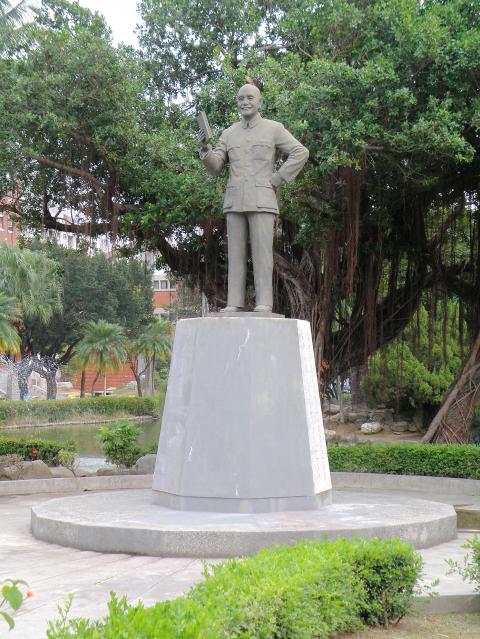The National Cheng Kung University (NCKU) earlier this week voted to remove a bronze statue of Chiang Kai-shek (蔣介石) from its campus and to relocate the structure to an indoor location.
The move came after protests led by students earlier this year.
At a school affairs meeting on Wednesday, more than half of those present voted to relocate the statue — currently located nearby Cheng Kung Lake (成功湖) on the campus — to the university’s archive. The relocation is slated to take place early next year.

Photo: Meng Ching-tzu, Taipei Times
An official from the university was quoted as saying that “the statue is part of history. There is no need to destroy it, otherwise these pieces of history won’t be found in the future.”
On Feb. 28 this year, a group of NCKU students marked the 65th anniversary of the 228 Incident by staging an art installation on campus to symbolize the horrific and brutal moment in Taiwanese history in the hope of raising public awareness about the nation’s past mistakes.
Members of the student organization 02 Group (零貳社) — whose name is a phonetic translation of “protest” in Hoklo (commonly known as Taiwanese) — hung a placard reading “1947-2012” on the statue and placed the names of victims of the 228 Massacre around the statue.
The 228 Incident refers to a massacre that sparked a massive 1947 nationwide uprising against the then-Chinese Nationalist Party (KMT) regime. The uprising was brutally crushed in a violent crackdown spearheaded by the state. That tragic event also marked the beginning of the White Terror era that saw thousands of people arrested, imprisoned and executed.
The students’ art installation this February stirred heated debate at the university about whether the statue should be removed.
Chen Yi-chen (陳以箴), head of the 02 Group, said the school’s decision to move the statue is a major breakthrough.
“This is just the beginning. We should dismantle all the symbols of authoritarian rule which still exist on campus,” she said.
She added that the university is treating the decision as a simple act of relocating a statue and is unwilling to consider the wider issues of authoritarianism on campus.
“Our university is quite conservative. In classrooms, administration facilities, in the interactions between faculty and students there are still leftovers of a past authoritarian mentality. Such a mentality needs be removed,” she said.

Alain Robert, known as the "French Spider-Man," praised Alex Honnold as exceptionally well-prepared after the US climber completed a free solo ascent of Taipei 101 yesterday. Robert said Honnold's ascent of the 508m-tall skyscraper in just more than one-and-a-half hours without using safety ropes or equipment was a remarkable achievement. "This is my life," he said in an interview conducted in French, adding that he liked the feeling of being "on the edge of danger." The 63-year-old Frenchman climbed Taipei 101 using ropes in December 2004, taking about four hours to reach the top. On a one-to-10 scale of difficulty, Robert said Taipei 101

Nipah virus infection is to be officially listed as a category 5 notifiable infectious disease in Taiwan in March, while clinical treatment guidelines are being formulated, the Centers for Disease Control (CDC) said yesterday. With Nipah infections being reported in other countries and considering its relatively high fatality rate, the centers on Jan. 16 announced that it would be listed as a notifiable infectious disease to bolster the nation’s systematic early warning system and increase public awareness, the CDC said. Bangladesh reported four fatal cases last year in separate districts, with three linked to raw date palm sap consumption, CDC Epidemic Intelligence

US climber Alex Honnold left Taiwan this morning a day after completing a free-solo ascent of Taipei 101, a feat that drew cheers from onlookers and gained widespread international attention. Honnold yesterday scaled the 101-story skyscraper without a rope or safety harness. The climb — the highest urban free-solo ascent ever attempted — took just more than 90 minutes and was streamed live on Netflix. It was covered by major international news outlets including CNN, the New York Times, the Guardian and the Wall Street Journal. As Honnold prepared to leave Taiwan today, he attracted a crowd when he and his wife, Sanni,

Taiwanese and US defense groups are collaborating to introduce deployable, semi-autonomous manufacturing systems for drones and components in a boost to the nation’s supply chain resilience. Taiwan’s G-Tech Optroelectronics Corp subsidiary GTOC and the US’ Aerkomm Inc on Friday announced an agreement with fellow US-based Firestorm Lab to adopt the latter’s xCell, a technology featuring 3D printers fitted in 6.1m container units. The systems enable aerial platforms and parts to be produced in high volumes from dispersed nodes capable of rapid redeployment, to minimize the risk of enemy strikes and to meet field requirements, they said. Firestorm chief technology officer Ian Muceus said